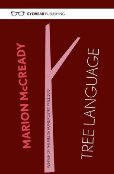reviewed by Kirsten Irving
Firmly Rooted in Mythology
Marion McCready is a poet of bloody intensity and highly loaded, symbolic imagery. Intricate observations of flowers and herbs morph into meditations on the brutality of nature and the ravaging of the body. See “Two Daffodils Lying on a Window Ledge” become a “contamination of my pretty home space”, “lying there like a childless couple”. Or the basil “growing scorpions in my brain”. Or the discreet harbinger “hand-print of wind-chill” in the title poem. The wilder, terrifying side of the natural world creeps closer to the speaker with every line.
Poetry that dives in with a small, keen dagger
I was most interested in McCready’s documentation of anxieties from myth and legend, particularly regarding children. Opening poem “Clever Elsie” is based on a Brothers Grimm fairytale, and features a Cassandra-like seer tormented by a gift she “didn’t ask for”, doomed to see her own son die in a war yet to happen.
It’s refreshing to see a poet who is also a parent eschew sentimentality in favour of delving into the superstitions and nightmares around childbirth and parenthood. Stillborn or early-taken children appear like fearful creatures from gothic Child Ballads or arresting memories. ‘Winter Girl’, “hair rising, river body”, is unsettling and slow, as if we are walking past the figure, under its constant observation. Pinned opposite this specimen is “Cursed”, in which a bereaved parent turns to superstition in order to make sense of a dead infant. Even indirectly, the references are raw in their echo. ‘Plant-Heart’ teases the reader with “The spider-ants/of your dead flowers/a last clutch of baby curls.”
It’s worth setting aside a space to talk about McCready’s poems on war. It’s a gutsy move to add in a subject that more traditionally carries collections on their own. Nevertheless, McCready weaves it cannily in, using imagery previously established in the collection. ‘The Promised Land’ transports us from the thorn scratches of Grimm-esque forests to the conflict of the Middle East and buses exploding under office windows. In another context, the line “Hands of hope, hands of blood” might have seemed melodramatic, but McCready’s work earns this drama with accumulated gravitas. You become aware you have been following not a trail of dark stones but a speckled path of blood. Blood which can only lead to more blood.
McCready being Scots, it would be easy to peg the religious elements of her work to a Christian background, but although the author’s voice is fiercely present throughout, I found myself worrying less and less about direct parallels with her own experience, and more about the tales she was telling. In ‘the wishbone tree’, “their shape-maker/forked author/and alter ego” could refer to the creator God, the trickster Lucifer or another entity altogether. Elsewhere, in ‘Brambles’, “death fruits/bloods of Christ” seems to play with sacrament as children’s rhyme and tall tale.
Let’s talk about production. Hardback, elegantly typeset on off-white, tasty shades of chocolate and raspberry (or blood and clotting) with complementary endpapers. There’s clearly a crack crew working on the Eyewear look. Designer Edwin Smet’s clean, expressive style is a fundamental part of the distinctive Eyewear house look. Using only lines and shapes which resemble paper cut-outs, he has for other titles conjured a Rottweiler, moonlight, weather phenomena and the outline of a stranger.
If you’re big on irony and detached cool, it’s most definitely not for you, but if you want poetry that dives in with a small, keen dagger, enjoy. As a collection, Tree Language is so dense, well-meshed and infused with spiced notes there’s almost too much to say. Subverting the kinds of themes that so often garner major prizes, this collection is determined to speak its own language.










